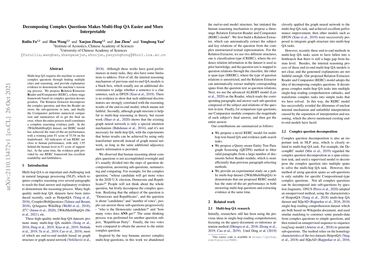Decomposing Complex Questions Makes Multi-Hop QA Easier and More Interpretable
Multi-hop QA requires the machine to answer complex questions through finding multiple clues and reasoning, and provide explanatory evidence to demonstrate the machine reasoning process. We propose Relation Extractor-Reader and Comparator (RERC), a three-stage framework based on complex question decomposition, which is the first work that the RERC model has been proposed and applied in solving the multi-hop QA challenges. The Relation Extractor decomposes the complex question, and then the Reader answers the sub-questions in turn, and finally the Comparator performs numerical comparison and summarizes all to get the final answer, where the entire process itself constitutes a complete reasoning evidence path. In the 2WikiMultiHopQA dataset, our RERC model has achieved the most advanced performance, with a winning joint F1 score of 53.58 on the leaderboard. All indicators of our RERC are close to human performance, with only 1.95 behind the human level in F1 score of support fact. At the same time, the evidence path provided by our RERC framework has excellent readability and faithfulness.
PDF Abstract Findings (EMNLP) 2021 PDF Findings (EMNLP) 2021 Abstract


 SQuAD
SQuAD
 HotpotQA
HotpotQA